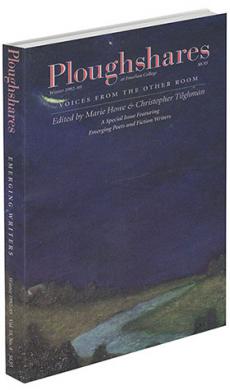rev. of The Star Cafe by Mary Caponegro
Mary Caponegro opens
The Star Café with the image of a "circular garland" that can only be appreciated if you "develop the telescope within yourself, your own inner eye, to see the beauty of the chain it makes, its variegated texture of feather, skin, fur; slimy or smooth." From the start, hers is no ordinary fictional world. The reader of these strikingly original stories is compelled to develop an adventuresome and wide-open inner eye to experience
The Star Café's richly variegated textures.
In "Materia Prima," Caponegro employs an intimate, free-flowing narrative voice to capture a young girl's first struggles with language ("inside in what is named apartment even though it is where we are together I have a little room which is nice when I feel like being just with me") and sexuality ("for the first time I see an older girl her different body things that have happened to it. Later in the cafeteria I eat bread and butter and it reminds me of her body when I spread the smooth yellow on the soft white I don't know why").
The title story features a young woman, Carol, whose impulsive encounter with a stranger traps her in a bizarre sexual funhouse. As she and the stranger make love, mirrored walls reflect only Carol's own body, forcing her to "witness the bleak absurdity of her body making love to the atmosphere." In addition to presenting what Caponegro deems "an extreme case of some kind of sexual etiquette," these mirrors force Carol — and the reader — to see sexuality itself in a new light. "The postures could be made to look ridiculous enough even with both parties attending, but then at least they were salvaged by familiarity."
To enter "The Star Café," the reader discovers, is to abandon the familiar. As the story progresses, the indefatigable "stranger" pushes Carol past her old sexual limits and makes her question even basic assumptions about his own. "Maybe he'd climaxed. But she suspected he had a completely different kind of sexuality, not based on that system." By the end of this eventually brutal encounter, Carol wonders if she can ever "go home again" or if she will find her home "all turned inside out and impossible to put back in order." Both shaken and awakened, in the end she is newly determined to keep on "exploring."
"Sebastian," the collection's novella — length finale, fuses together several themes Caponegro has developed in the previous three stories. Sebastian, a transplanted Englishman and frustrated writer, is torn between his love of order and his passion for his flamboyant fiancée.
In her playful pet names ("Sebastard," "Sea Bass," "S o’ B") and in the erotic games she ceaselessly invents ("making word-play as foreplay, stringing the words together into sentences that would be uttered while kissing"), Sarah toys with destroying "the closest thing" Sebastian has to a religion: his reverence for language.
Wandering through a cityscape rife with ugly American distortions of language ("THANX and PIX and NU"), Sebastian longs for the perfect wordless communion of flesh he shares with Sarah, the wonder of "their two earthbound bodies which when together are released from gravity, weightless, as if in water or space."
For Sebastian and for the reader, commonplace city scenes become maddeningly eroticized. At a post office, Sebastian watches customers "put their tongues delicately to the gummed reverse side of shells, faces, flags." Finally, searching for the elusive Sarah at her artist's studio, Sebastian finds himself incorporated into the chaotic and disorienting "artworks" through which Sarah defies his firmly held belief that art should provide "a kind of order, rather than the opposite."
After failing to lure Sarah home with him to their bed, Sebastian wonders if it is his fate "to have ecstasy bound always with its opposite." Sure now that their intense relationship will soon burn itself out, he feels hopelessly trapped. "Since the world can't possibly be adequate after a visit to heaven, and since the erotic paradise he and Sarah frequently inhabit is the epitome of exaltation, is it not logical that any post-coital landings could not help but feel a fall?"
Appropriately, Caponegro ends this story and her collection with Sebastian literally suspended between Sarah on top of her studio and the hard "floor below." Caponegro's powerful final description of Sebastian's predicament epitomizes the "stuckness" experienced by characters throughout
The Star Café, trapped between spiritual longings and the more earthly needs of the "flesh and blood we all, at least partly, are." In Caponegro's hands, this classic theme — like many of her shape-shifting characters — undergoes some startling transformations. As is subtly promised by the title of her opening story, "Tales From the Next Village," Mary Caponegro's groundbreaking collection comes to us fresh from fiction's next new frontier.


